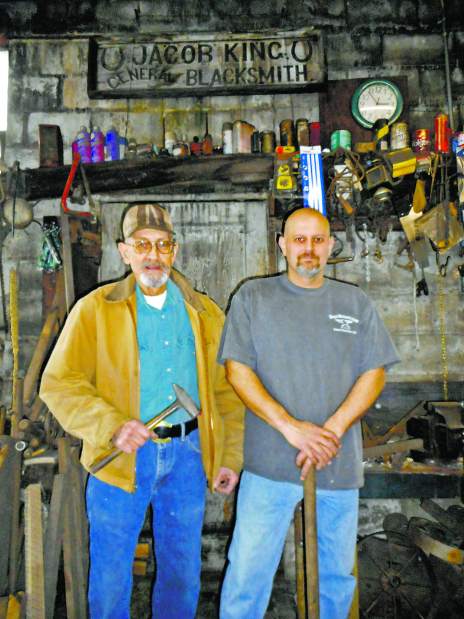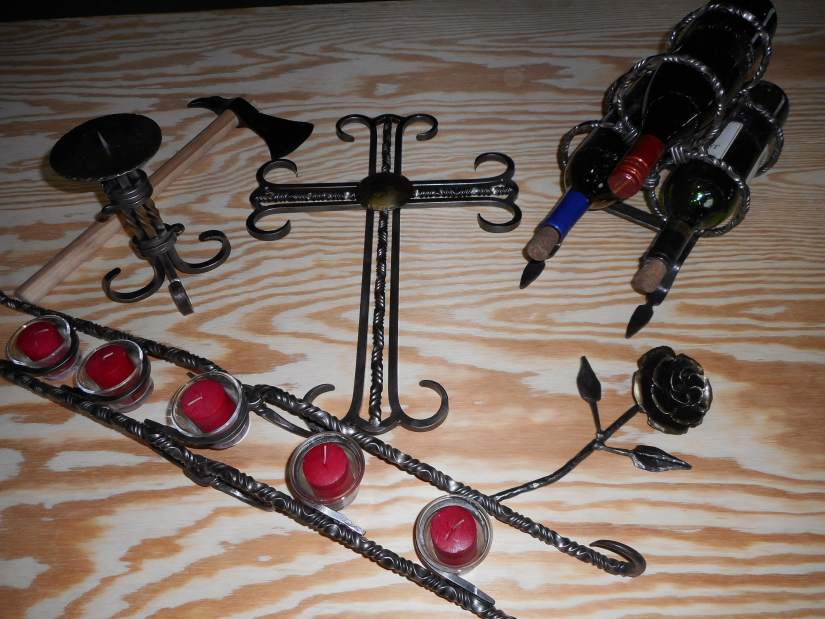Father-and-son blacksmiths still firing up forge in Farmington
While traveling the byways of the Laurel Highlands it's hard not to be overwhelmed by a sense of nostalgia. It's easy to imagine a scene from the past materializing near an old farmstead or a historic figure appearing around the next bend in the road.
Bygone days of pioneer times become a reality, however, when visiting Gene King and his son David of Farmington who still fire the forge of a blacksmith shop just a stone's throw from the old National Road.
In 1905 Jacob King, Gene's grandfather and David's great-grandfather, constructed a large shop for blacksmithing and shoeing horses approximately 15 miles east of Uniontown — a stone's throw from today's intersection of routes 40 and 381. The venerable wooden building was later razed and replaced in 1950 by a cement block structure that houses a working forge and welding shop nearby the King family home.
“ I fiddled around in grandfather's shop when I was little,” Gene King said. “Dad (John King) put me to work welding when I was 12. Then I went into the Army when I was 19 during the Korean War. I was in basic training when they quit fighting so I went to engineering school and was sent to France to work on building an air base. I stayed there until I went home to be discharged at the age of 21 and went back to the blacksmith shop, and have worked there ever since.”
Officially, Gene King retired at the age of 72, but has, as often as not, found himself, “fiddling around” on a project.
“I'm 81 years old,” he said. “Most people that age aren't doing much and here I was this winter making Christmas gifts,” he laughed.
Mug racks, candle holders, fireplace tools and an occasional artistic venture attest to the abilities of Gene and his son David who is now carrying the family vocation into a fourth generation.
David King agrees that today's smithing differs from the craft of his forbearers in that the earlier work was largely utilitarian while today's is more artistic and ornamental.
“Most blacksmiths do ornamental work today – you don't have the old fashioned blacksmiths who sharpened tools and did the sorts of things Dad used to do before his retirement,” he said. “At one time the blacksmith was the hardware store and he was the service station – he did just about everything. When factories came along they would have a whole crew making hinges, parts for wagons, hooks, single and double trees to hitch teams of horses and so on.”
For centuries, the neighborhood or wayside blacksmith shop was an essential part of the community. It's virtual disappearance came, or course, with the advent of the automobile. Farriering – the shoeing and trimming of hoofed animals such as horses, mules, and oxen – were a specialty of local smithing shops. Commercial demand for farriers faded last in local mining operations when horse and pony mines disappeared in the 1950s. Jacob and John King both knew the art of shoeing animals, though neither Gene nor David acquired the skill.
Although David King works full time at a local T-shirt graphics company, he finds time on weekends and evenings to create artfully inspired candleholders, crosses, roses, as well as functional items such as hooks, fireplace tools and fire screens. His portfolio of work appears on a Facebook page as “King's Blacksmith Shop.” Sometimes his father joins him in designing a one-of-a-kind item or a special piece of custom work.
The elder King is a member of both the Pittsburgh Area Blacksmith Association and the Appalachian Blacksmith Association. He believes his continued interest in the craft comes from regional get-togethers known as “hammer ins” where groups of smiths meet to show off their skills or watch the work of a master craftsman.
“What held my interest in blacksmithing is learning how to do new stuff, ” he said.
David King credits his father's continued interest in learning the “new stuff,” to have inspired him to carrying on the craft to the fourth generation of in the King family.
“He's a good teacher,” David king said. “He's taught me everything I know.”
Franklin LaCava is a contributing writer for Trib Total Media.



